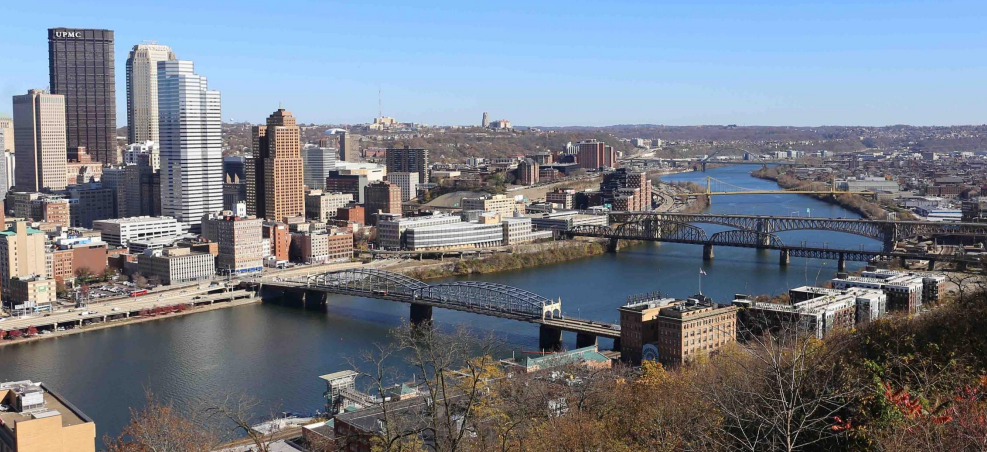Closing Regional Economic Divides - Strengthening Democracy

Explore the economic divergence among geographic regions within the US and European Allies – the “Great Convergence” of work to close them – and the implications for the future of our democracies.
As the world’s economy has evolved from agricultural to industrial to today’s global technology and knowledge-driven economy, here at home in the US and within other Western democracies there have grown yawning geographic economic divides between once thriving rural and industrial heartlands and today’s global city-regions. These gulfs in opportunity affect our politics as residents of communities struggling to successfully navigate the waters of economic change are anxious, often angry and responsive to nostalgic, nationalist and resentment driven populist movements.
Today there is a growing convergence of effort—across our democracies—to bring new economic opportunity and optimism to residents of “left-behind” regions in order treat the root cause of the polarizing politics that threaten our democracies. (Work summarized in our new report The Great Convergence: The Race to Save Democracy, just released from the Eisenhower Institute).
Join Dr. Raphael L’Hoeste, German Deputy Director, Competition and Structural Policy, German Federal Ministry for Economic Affairs and Energy, and Eisenhower Institute and Brookings Institution Senior Fellow John Austin, leader of the international Heartlands Transformation Network--in a spring 2025 Semester program to explore:
- Why regional economies evolve differently, and what this means for our politics
- What the US, Germany and other European nations have done, and are doing today, to bring growth and opportunity to regions navigating an economic transition
- Engage with and help gauge the effectiveness of today’s geographic-place focused efforts at economic regeneration, and draw lessons for the future health of our economies and democracies
Program Schedule and Activities
Thu-Fri Jan 16-17: Overview and Orientation
Comparative Regional Development/Economic Development History:
- US – How and why did the North/Midwest develop a different economy & politics than the US South and Appalachia? What were the implications for what happened at Gettysburg and in the US Civil War? For our Society and Politics Today?
- Germany – Europe: Regional Economic Development Patterns in Germany & Other European Nations. Differential Development Patterns Within Germany. Variations Across Europe
- Field Trip – Washington DC. Meet with Scholars leading regional/place-based economic policy such as:
- Mark Muro, Tony Pipa, Fiona Hill, Lavea Brachman, Brookings Institution
- Neal Brown, Progressive Policy Institute
- Jeffrey Anderson, Georgetown University BMW Center for German and European Affairs
- Brent Orrell, AEI, American Enterprise Institute
- Terry Tucker, Director of Industrial Policy and Trade Roosevelt Institute
Sessions at Gettysburg College
- Tuesday, January 28: 4:00 pm - 6:00 pm
- Saturday, February 8: 10:00 am -12:30 pm
- Tuesday, February 11: 11:45 am - 1:00 pm
- Saturday, February 22: 10:00 am - 12:30 pm
- Tuesday, March 4: 11:45 am - 1:00 pm
- Tuesday March 18: 11:45 am - 1:00 pm
- Saturday, March 22: 10:00 am - 12:30 pm
- Saturday, March 29: 12:00 pm - 1:00 pm
These sessions will examine:
- Comparative Regional Development/Economic Development History – US & Europe
- US Experience with Regional Economic Policy
- German and European Structural Change & Cohesion Policy
- Impact of US Place Based Policy – Lessons from Recent Experience – Implications for Politics
- Germany and European Cohesion Policy: Lessons from Experience –Current Implications
- Capstone Assignment: Describe, evaluate and assess economic and political impact of US & German/European Place Based Policy
Friday, April 11, 2025: DC Capstone Presentation
Present findings of capstone assignment on place-cased policy to an audience of DC stakeholders (briefing at Friedrich Stiftung Foundation, Progressive Policy Institute, Eisenhower Institute, or Brookings Institution).